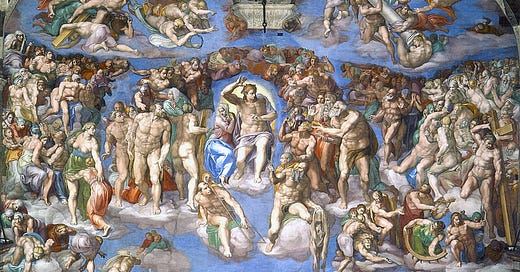Matthew 25:31-46 is a key part of Jesus' final sermon in the Gospel of Matthew. Starting from Matthew 24:36, Jesus talks about being ready for His second coming. The theme of readiness culminates in a “vision of judgment” in Matthew 25:31-46. Before this, Jesus uses parables to explain what it means to be prepared, highlighting the commendable lifestyle at His coming. But in Matthew 25:31-46, Jesus sets the criterion for judgment: how people treated "one of the least of these my brothers (and sisters)" (Matthew 25:40).
The Debate on Matthew 25:46
Matthew 25:46 has sparked much debate among Christians. It seems to suggest that one's eternal fate—whether eternal punishment or eternal life—depends on acts of kindness, especially toward the poor and needy. This seems to conflict with Ephesians 2:8, which states, "For by grace you have been saved through faith. And this is not your own doing; it is the gift of God." Salvation, according to the Christian faith, cannot be earned by good works. However, the contradiction is more apparent than real. Understanding who "one of the least of these my brothers (and sisters)" refers to in Matthew's Gospel resolves this issue.
Summary of “The Vision of Judgment”
In Matthew 25:31-46, Jesus describes Himself as a king separating people like a shepherd separates sheep from goats. The "sheep" on His right have shown compassion by feeding the hungry, giving drink to the thirsty, welcoming strangers, clothing the naked, caring for the sick, and visiting prisoners. These acts are considered as done for Jesus Himself, and they are rewarded with eternal life. The "goats" on His left failed to do these acts of kindness and are condemned to eternal punishment.
Understanding "The Least of These" and "My Brothers (and Sisters)"
In verse 39, the "sheep" ask when they did these things for the king. In verse 40, the king replies, "Truly, I say to you, as you did it to one of the least of these my brothers, you did it to me." So, who are "the least of these" and "my brothers (and sisters)"?
Interpretations
General Needy View
One view is that "the least of these" are anyone in need, especially the poor and marginalized. While this view is appealing, it lacks strong exegetical support.
Disciples View
The second view is that "the least of these" are Jesus' disciples. This has better exegetical support. The term "the least" is an intensive form of "little ones," referring to vulnerable and marginal disciples. In Matthew 10:42, it refers to disciples on a mission and positive responses to their mission. In Matthew 18:6, "little ones" are those who humble themselves like children and believe in Jesus. They are precious to God (Matthew 18:10, 14).
The term "my brothers (and sisters)" in Matthew, except for natural family relations (Matthew 4:18-2; 10:2), refers to disciples who do God's will as revealed by Jesus (Matthew 5:47; 7:3-5; 12:46-50; 18:15-21; 23:8; 28:10). Also, Jesus is identified with the disciples in Matthew 10:40. Welcoming a disciple (a metaphor for believing the gospel in Matthew 10:11-14) is like welcoming Jesus and God. This is the same criterion used in Matthew 25:40. Jesus is present with the disciples as they engage in their mission (Matthew 1:23; 18:20; 28:20).
Thus, studying the terms "the least" and "my brothers (and sisters)" in the context of Matthew's Gospel shows that the righteous responded positively to the mission proclamation. By becoming followers of Jesus, they commit to a lifestyle that continues Jesus' service among the needy. Therefore, the judgment here is based not on works but on the response to the gospel shared by Jesus' disciples.
Application
So, in light of this interpretation, what should we do as Christians? I want to bring out two points:
Support and Uphold Fellow Believers in Mission: Recognizing that "the least of these" refers to the disciples of Jesus, we should be encouraged to support and uphold fellow believers who are engaged in mission work. This can be done through prayer, financial support, and providing practical help to those spreading the gospel. It is essential to see mission work not just as the responsibility of a few but as a collective endeavor where the entire Christian community is involved. Encouraging and aiding missionaries and those involved in ministry is a way of participating in their mission and, by extension, in Jesus’ mission.
Cultivating a Gospel-Centered Community: Christians should strive to create and nurture communities where members care for one another, reflecting the mutual care and support highlighted in Matthew 25:31-46. This involves being attentive to the needs within the church community, ensuring that no member is neglected or overlooked. Small groups, church committees, and fellowship activities can be platforms for building strong, supportive relationships that reflect Christ’s love. Also, acts of kindness and compassion can be powerful witnesses to the gospel. By serving others, Christians demonstrate the love of Christ in tangible ways. This witness can attract others to the faith and provide opportunities to share the gospel. Encouraging church members to engage in community service and outreach not only helps those in need but also showcases the transformative power of the gospel at work in believers’ lives.
May God help us to do God’s will in our lives!




